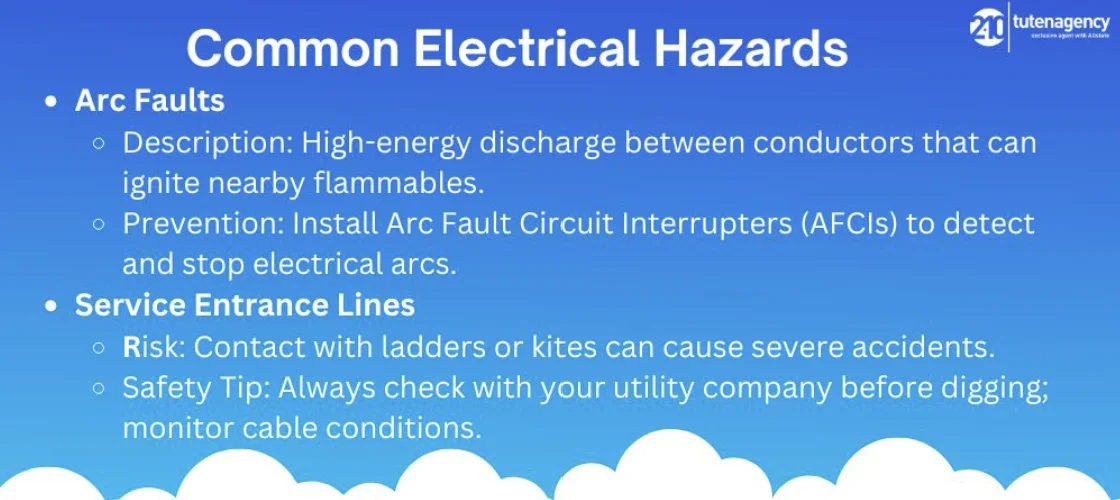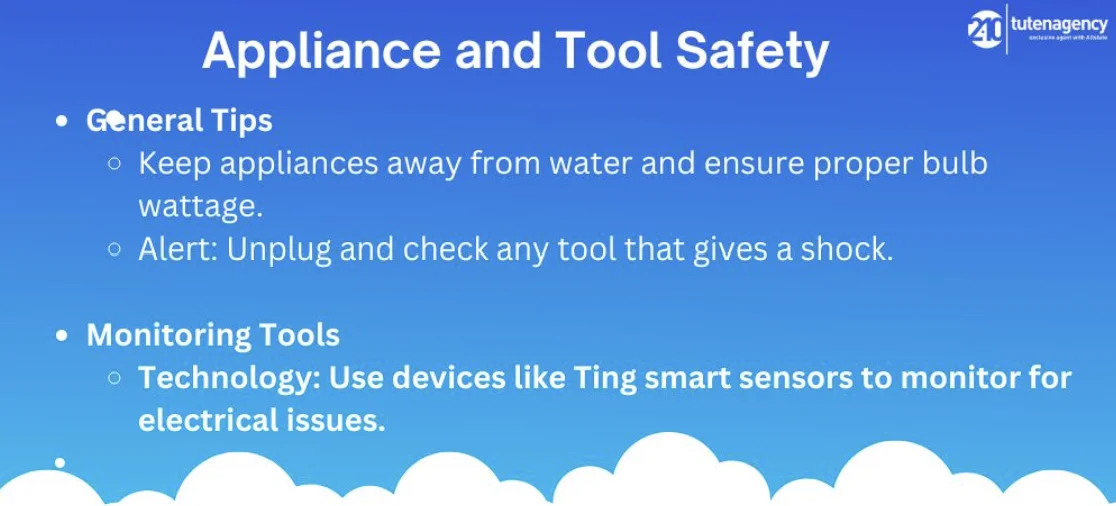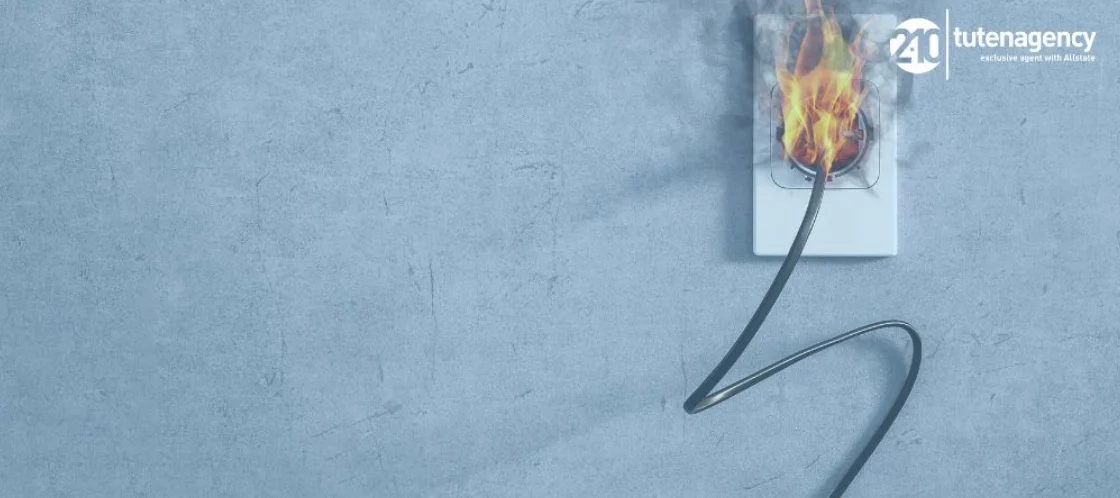Electrical safety is vital for every home. Electricity is essential in everyday activities but can pose serious risks if not managed correctly. This guide explores common electrical hazards in residential settings and advises preventing them to keep your family safe.
Understanding Common Residential Electrical Hazards
-
Arc Faults
An arc fault occurs when a high-energy discharge between two conductors creates intense heat that can ignite flammable materials nearby. These often result from worn or damaged appliance cords. Installing Arc Fault Circuit Interrupters (AFCIs) in your home is a smart move to avoid these hazardous situations. These devices operate similarly to standard circuit breakers but can also identify and halt electrical arcs.
-
Service Entrance Lines
The cables that bring power to your home from outside are called service entrance lines. They can be hazardous if they come into contact with objects like ladders or a child’s kite. To avoid accidents, exercise caution around these lines and contact your utility company before digging around your property. Also, keep an eye on the condition of your entrance cables; old or damaged cables can also pose risks.

Fuse and Circuit Breaker Safety
-
Maintenance of fuse and circuit breaker boxes
Your home’s electrical panel should always be closed, and the area around it should be clear of flammable materials. If you see burn marks, hear unusual sounds like buzzing or cracking, or smell burning plastic around your electrical panel, it’s time to call a qualified electrician.
-
Troubleshooting Common Issues
If your fuses frequently blow or your circuit breakers often trip, this could indicate that your circuits are overloaded. It’s important not to overlook these signs. Instead, bring in a professional to inspect and potentially upgrade your electrical system to handle a greater capacity safely.
Wiring and Electrical Cords
-
Wiring Inspection and Maintenance
Old, damaged or worn wiring can lead to electrical hazards such as shocks or fires. If your home’s wiring has not been checked or replaced in over thirty years, consider having a professional evaluate its condition and replace it if necessary.
-
Safe Use of Electrical Cords
Extension cords should be used only as a temporary fix. Ensure that you choose a cord that is the appropriate size for the load it needs to support. Avoid placing cords under carpets or creating sharp bends, which can lead to overheating and damage.
Electrical Receptacles and Switches
-
Receptacle and Switch Maintenance
Ensure all outlets and switch covers are securely fastened to avoid exposure to live wires, which can be extremely dangerous. If an outlet or switch begins to spark, make noise, or smell like it’s burning, have it inspected by an electrician immediately.
-
Enhancements for Safety
Add ground fault circuit interrupters (GFCIs) and weatherproof covers to outdoor outlets. It’s also wise to install tamper-resistant outlets or protective covers for homes with young children to enhance safety.
Safe Operation of Electrical Appliances and Tools
-
General Safety Tips for Appliances
Always ensure that appliances are kept from water, use appropriate wattage bulbs for light fixtures, and never remove the grounding prong from plugs. It’s also important to keep heating appliances clear from anything that can burn, like curtains or furniture.
-
Handling and Maintenance of Electric Tools
If you ever feel a tingling sensation when using an appliance or tool, stop using it immediately and have it checked by a professional. This could be a sign of a serious electrical fault.
Proactive Electrical Safety Measures
-
Monitoring Your Home’s Electrical Network
You can actively monitor your home’s electrical system for potential hazards using smart sensors like the Ting smart sensor. These devices can alert you to issues before they become serious problems.
-
Educational Tips and Resources
Being informed about electrical Safety is essential. Learn as much as possible about protecting your home and loved ones from electrical dangers. Keep useful resources bookmarked and readily accessible for quick reference.

Conclusion
Maintaining Electrical Safety in your home is not just about installing the right equipment; it’s also about vigilance and maintenance. Understanding and managing the risks ensures your home remains a safe haven for everyone living there. Stay aware and proactive about electrical Safety—it could save lives.
FAQs
What should I do if water has come into contact with electrical outlets or wiring?
If water contacts your electrical outlets or wiring, it’s crucial to act safely. Avoid touching or attempting to use the affected outlets and wiring. Immediately shut off the power at the main circuit breaker, if possible, and contact a licensed electrician for an inspection and necessary repairs.
What are the signs that an electrical outlet is not working properly?
Signs of a faulty electrical outlet include a lack of power, sparks when plugging in or unplugging cords, a burning smell, discoloration of the outlet cover, or the outlet feeling unusually warm to the touch. If you notice any of these signs, cease using the outlet and consult a professional.
How can I tell if my home is at risk for electrical fires?
Key indicators of potential electrical fire risks include frequent circuit breaker trips, flickering lights, burning smells from appliances or outlets, and unusually warm or buzzing electrical panels. If you observe any of these symptoms, it’s advisable to have an electrician perform a thorough inspection as soon as possible.
Is it safe to do minor electrical repairs at home by myself?
While some minor electrical tasks, like changing a light bulb, are generally safe for DIY, more involved tasks such as replacing outlets, switches, or any work involving the breaker box should be performed by a qualified electrician. Working with electrical systems can be dangerous without the proper knowledge and tools.
Get the right coverage for your home with tutenagency
New tutenagency customers?
Quote homeowners insurance online or call (334) 502-5111 to insure your home.
Legal Disclaimer: ADVERTISING MATERIAL ONLY. Do not rely on this site or this article for legal or financial advice. The information provided on 210agency.com is strictly for educational purposes and to provide you with general educational information. Since state laws and financial regulations are subject to change, please schedule an appointment with an attorney or qualified financial advisor in your area to further discuss your personal situation. This public information is neither intended to, nor will it, create an attorney-client or financial representative relationship.

